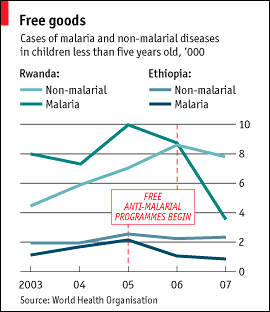‘Giving bed nets may be the way to deal with malaria’, was the heading in The Economist January 31st 2008.
The Economist went on to say: ‘A recent study in Kenya suggested providing malarial areas with large numbers of free bed nets brought better results than selling them drugs. Now a new survey by the World Health Organisation (WHO), on behalf of the Global Fund to Fight AIDS, Tuberculosis and Malaria, has shown that the approach works well in other countries, too.

Giving away insecticide-impregnated nets free to anyone visiting a clinic (the nets stay potent for about five years) was not the only new thing about the operations. In all cases, the countries rolled out nationwide campaigns instead of relying on local ones. In many cases, they also gave away drugs based on artemisinin, a substance to which the malarial parasite has yet to develop widespread resistance.
Nets and artemisinin are two planks of malaria control. The third is to spray the inside of people’s houses with DDT, to kill female mosquitoes when they settle to digest their blood meals. The objective is to achieve 80% take-up in each village. At that point, the cycle of transmission from mosquito to human to mosquito is broken in a way similar to the action of a vaccine; this stops the spread of the disease, and thus protects everyone.
YouMe Support Foundation is looking into means of raising funds to provide the people of the northern islands of Vanuatu, where malaria is a serious issue.
If anyone can help us source these mosquito nets, please contact us.
